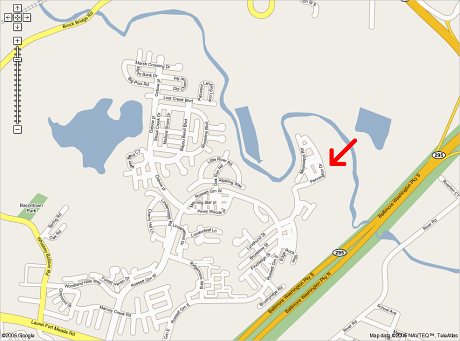We finally exist!
February 21, 2005
I have been waiting for this day to come. Our street has now made its way onto the internet! Perhaps now people coming to visit us won't get lost since online directions will now take them straight to our doorstep.
I decided to look up my street again while checking out one of google's latest hacks. It is somewhat ironic that I came across this new service of Google tonight because it was just yesterday that my cousin, Bryan, asked me what new stuff Google labs had up its sleeve. At this time, I had nothing. I guess my response should have been "Google Maps." Those sure are some purty maps.
Here is proof we exist:

Posted at 12:59 AM in General |  Permalink
|
Permalink
|  What, no comments?
What, no comments?
Sticky Keys: Not Just for the Disabled Anymore
February 07, 2005
Although the accessibility feature sticky keys has been around since the dawn of modern operating systems (and quite possiblity before that), it wasn't until recently, when I was playing with one-handed typing, that I discovered their value. At first, I couldn't figure out how I would be able to type uppercase characters or combo commands using the one-handed typing. When I came across sticky keys, it all came into focus. The solution. Sequences.
What frustrates me, and probably the reason I didn't discover them earlier, is that they are always documented as a feature for disabled people who are unable to press two keys down at once. I have found that, in fact, they are so useful that I believe they should be considered a feature for all users. Many key combinations make you do finger acrobatics just to get all the keys down at once. Even those moves that don't require such stretching are much simpler when done in sequence.
Sticky Keys are availabe in both KDE and Gnome. Even if you have two good hands, definitely it a try. Your mangled wrists will thank you.
Update: Thinking back to my grade-school days, I recalled an experiment that was done in which the proficiency of finger movement was observed when one finger was held fixed contrasted with finger movement of a free hand. The impaired speed is explained by the workings of the sympathetic nervous system. The nervous system is attempting to move the coorelated digit, but since it is restricted, it affects the performance of the intial movement.
Piano players and guitar players alike must combat this effect through training, which is apparently possible to overcome. Regardless, enabling independent key strokes for combination commands will almost always out perform typical counterpart.
Posted at 09:15 PM in Usability |  Permalink
|
Permalink
|  Comments (1)
Comments (1)
Eclipse, Learn from Mozilla
February 07, 2005
When I first began advocating the Mozilla web browser, the biggest obstacle I encoutered was helping those interested actually find the download link. No matter how many times I told these folks, they still could not seem to locate the link. In truth, they probably were afraid of downloading the wrong file and therefore didn't even try to click on anything.
After several years of watching people use computers, I have learned that it is necessary to make the target button VERY clear. You would be absolutely amazed at how long it takes a person's eye to find a target on the page the very first time, and often, this is your program's only shot. There is nothing shameful about a really huge button. Case in point, Mozilla. The download for firefox takes up nearly the entire first half of mozilla.org, but at least people cannot claim that the link was too hard to find. Mission accomplished.
I have read that Eclipse is working on a prototype for the new download page, but I have to say, even that page is overwhelming. The feedback I usually receive about Eclipse is that the SDK is either too large or it doesn't seem like the right download for doing development. I happen to agree. Why do most developers need the whole SDK just to write some Java code? Eclipse should make a "developer's" package available that just includes the platform and the JDT (since that is the primary plugin for Eclipse).
Posted at 08:51 PM in Open Source, Usability |  Permalink
|
Permalink
|  What, no comments?
What, no comments?
No longer Silver
February 02, 2005
A while back, I posted with excitement about becoming a Silver member of MandrakeClub. Last month, that membership finally expired after two years and I am deciding not to renew it. While I could probably go on and on as to why I decided to let this membership expire, the simple explanation is that I just wanted to try something new. That's why I choose Linux in the first place and likely, that underlying motivation will always be present. Luckily, the average person is acquiring more and more personal computers, so there is still plenty of opportunity for diversity.
Below is the note I wrote to Mandrake upon leaving, which they had requested of me before I went.
Read More...
Posted at 12:35 AM in Linux |  Permalink
|
Permalink
|  What, no comments?
What, no comments?
